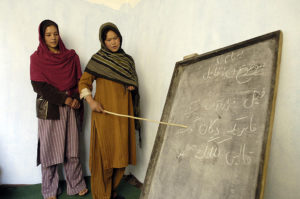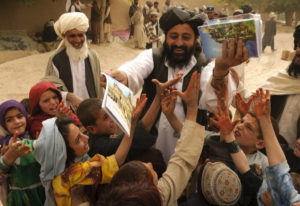
Image courtesy United Nations Photo | Flickr
The Kabul-based, non-governmental organization Aschiana provides educational, health, and social services aimed at improving the welfare of Afghan children who work on the streets in order to support their families. The children, who typically perform low-paying street labor such as polishing shoes and selling matches, earn an average of $20 a month. They have often lost one or both of their parents and are unable to attend school full time because they are relied upon as their household’s primary wage earner.
In an effort to provide a safe environment for these children to develop academic and occupational skills, engineer Yousef Mohamed established the first Aschiana education center in the Shar-I-Naw neighborhood of Kabul in 1995. Aschiana, which means “the nest” in Dari, gradually expanded, and by 2001 it had established the six centers it now operates in separate districts throughout Kabul. Since its inception more than 20 years ago, Aschiana has assisted over 50,000 children and young adults.
At each center, schedules are adapted to the needs of children who work, with classes taught in split morning and afternoon sessions, in order to allow students time to work at their jobs during the intervening period and continue earning money vital to their families. Aschiana also offers home-based education in various areas of Kabul for those children unable to attend one of its centers. Along with basic school materials like pens, paper, and textbooks, Aschiana supplies all students with soap, toothpaste, clothing, and lunch.
Basic Education and Vocational Training
Since they missed earlier formal schooling, the more than 6,000 children who participate in Aschiana’s programs each day possess educational attainment levels far below their age. Children take an initial assessment test so that they can begin learning in a class appropriately matched to their abilities. The organization’s staff aims to help the younger children acquire the academic and social skills necessary to complete their education in government-run schools, while providing older students with the literacy instruction and vocational training necessary to work in a skilled trade.
The basic education curriculum offered by Aschiana encompasses Islamic studies, mathematics, and reading and writing courses in Dari, Pashto, and English. Students entering vocational training can choose an occupation to study out of a diverse selection of fields, ranging from garment tailoring and cosmetology to electrical repair and information technology. Beyond these core components, Aschiana students also receive instruction in landmine awareness, peace education, and other subjects that equip them with the knowledge to safely and productively engage in everyday encounters in their social and physical environment.
Supporting Student Health, Safety, and Psychological Stability

Image courtesy ResoluteSupportMedia | Flickr
Committed to delivering holistic support that meets more than just educational needs, Aschiana facilitates services to help ensure the physical and psychological well-being of its students. All of the children take lessons in preventive health and hygienic practices, and once a week each center receives a visit from a mobile clinic whose practitioners perform routine examinations and treat minor medical conditions. A physical education program promotes exercise and provides many of the children with their only opportunity to engage with their peers in team sports such as volleyball.
In order to attend to students’ emotional and mental health needs, the staff at each of Aschiana’s Kabul centers includes a full-time social worker. In addition to guiding children through psychological development and the process of dealing with traumatic situations they have endured, social workers maintain communication with the students’ family members and conduct informative interventions that explain the impact of mistreating children. In cooperation with families, Aschiana staff members develop plans to modify harmful behaviors and protect children from abuse and neglect.
Rounding Out Academics with Arts Education
Through enrichment and recreation programs, Aschiana fosters a therapeutic environment where children who rarely have the time or a safe space to play are able to express themselves and strengthen their sense of individual identity. Children have an opportunity to participate and learn techniques in creative disciplines such as theater, storytelling, ceramics, and music. The activities also help to impart to the children a respect for their native cultural inheritance in areas such as the use of traditional Afghan songs and instruments to teach music.
Visual arts offered at Aschiana include classes in calligraphy, wood carving, watercolors, and oil painting. Every student at Aschiana takes painting lessons, and as they progress in their studies they have the opportunity to undertake individualized instruction. Aschiana provides students with all the necessary painting supplies, as well as a personal workspace and an exhibition area to display and sell their pieces. When students sell their paintings, half of the proceeds go to the artist, and the other half goes toward covering the cost of the apprenticeship program and its continued operation for future students.
Extending Assistance to the Children of Returning Refugees
Augmenting its centers inside of Kabul, Aschiana runs six outreach stations for children who live in settlements for internally displaced people (IDP) on the outskirts of the city. The outreach camps consist of temporary tents, where Aschiana provides basic education for more than 2,000 children of returning refugees. In conjunction with teaching classes in civics and religion, Aschiana helps to assimilate the children to the social norms of an unfamiliar setting and prepares them for entry into government-administered schools.
Beyond Kabul, Aschiana has another eight IDP outreach centers in Mazar-e-Sharif, Herat, Gardez, and Parwan. Collectively, these tented outposts deliver education, vocational training, and rehabilitation services to over 1,400 children.

